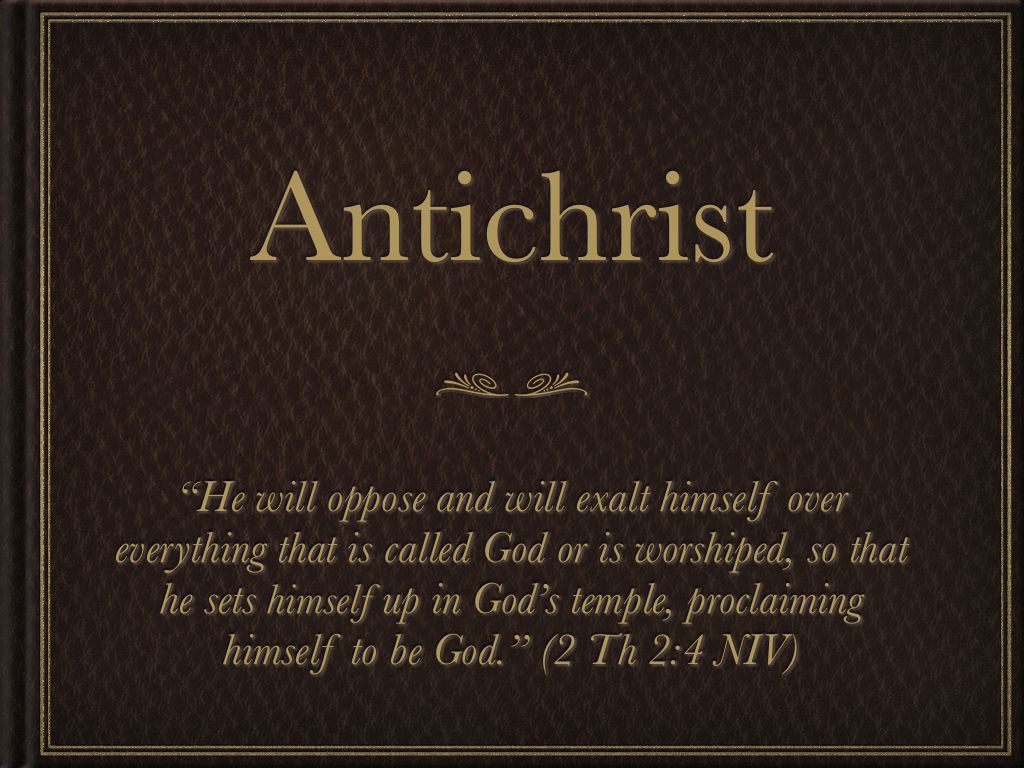Alright folks, let’s dive into something that’s been sparking debates, mysteries, and curiosity for centuries: the antichrist. If you’ve ever scratched your head wondering who or what the antichrist really is, you’re not alone. This topic is as intriguing as it gets, blending religion, history, and even pop culture. So, buckle up, because we’re about to explore everything from the origins of the concept to its modern interpretations. And no, this isn’t just for Bible scholars—this is for anyone curious about one of the most debated figures in human history.
Now, before we dive deep, let’s set the stage. The term "antichrist" isn’t just a random word thrown around in apocalyptic movies or conspiracy theories. It’s deeply rooted in religious texts, particularly in the Bible. But here’s the kicker—it’s not as straightforward as you might think. Different religions, scholars, and even Hollywood have their own takes on who or what the antichrist might be. So, whether you’re a believer, a skeptic, or just someone looking for answers, this article’s got you covered.
Our mission today is simple: break down the concept of the antichrist in a way that’s easy to understand, backed by credible sources, and sprinkled with a dash of humor to keep things light. After all, discussing the end times doesn’t have to be all doom and gloom, right? Let’s get started and uncover the truth behind this enigmatic figure once and for all!
Read also:Black Eye Club Members The Elite Group Yoursquove Always Wondered About
Table of Contents
- Origins of the Antichrist Concept
- Biblical Views on the Antichrist
- Historical Interpretations of the Antichrist
- Modern Perspective on the Antichrist
- Antichrist in Pop Culture
- Common Myths About the Antichrist
- Debunking Antichrist Theories
- Signs of the Antichrist's Arrival
- Theological Impact of the Antichrist
- Conclusion: What Does It All Mean?
Origins of the Antichrist Concept
Alright, let’s rewind the clock and talk about where this whole antichrist thing started. The concept of the antichrist isn’t exactly a new idea. In fact, it dates back thousands of years, with roots in ancient religious texts. But here’s the interesting part—it wasn’t always called the "antichrist." Back in the day, different cultures had their own versions of an evil figure who would rise to challenge the divine order. Think of it like the original villain in humanity’s story.
So, what makes the antichrist so special? Well, the word itself comes from the Greek "antichristos," which roughly translates to "against Christ" or "in place of Christ." See, the idea was that this figure would try to deceive people by pretending to be something they’re not. It’s like the ultimate con artist, but on a cosmic scale.
Early References in Religious Texts
Now, if we flip through the pages of history, the earliest mentions of the antichrist pop up in the New Testament. Specifically, the Apostle John talks about it in his epistles, warning believers to watch out for false prophets and deceivers. But here’s the twist—John doesn’t give us a detailed description. Instead, he leaves it open to interpretation, which has led to centuries of debate.
And let’s not forget the Book of Revelation, where things get really interesting. While it doesn’t explicitly name the antichrist, it does describe a beast with horns and a whole lot of power. Some scholars argue this beast might be the antichrist, while others say it’s a separate entity. Confusing? You bet. But that’s what makes it so fascinating!
Biblical Views on the Antichrist
Let’s dive deeper into what the Bible actually says about the antichrist. Now, this part can get a little tricky because different denominations have their own interpretations. But fear not—we’ll break it down in a way that’s easy to digest.
First off, the New Testament gives us a few key clues. In 1 John 2:18, John warns that "even now many antichrists have come." Yep, you heard that right—there might not be just one antichrist. Some scholars believe there could be multiple figures throughout history who fit the bill. But don’t worry, we’ll get into that later.
Read also:Does Zahn Mcclarnon Have A Twin Brother Discover The Truth About This Talented Actor
Key Characteristics of the Antichrist
So, what exactly makes someone or something the antichrist? Here’s a quick rundown:
- They oppose or deny Christ.
- They deceive people with false teachings.
- They often appear charismatic and persuasive.
- They rise to power during a time of great turmoil.
Now, these traits might sound familiar if you’ve ever watched a movie about the end times. But here’s the thing—these aren’t just Hollywood inventions. They’re based on biblical descriptions and have been interpreted by scholars for centuries.
Historical Interpretations of the Antichrist
Throughout history, people have pointed fingers at all sorts of figures, claiming they were the antichrist. From Roman emperors to modern-day leaders, the list is long and varied. But how do we separate fact from fiction? Let’s take a look at some of the most notable interpretations over the years.
For example, during the Middle Ages, many Christians believed the Pope was the antichrist. Crazy, right? But back then, the idea of a corrupt church leader aligning with biblical descriptions seemed plausible to some. Fast forward to modern times, and you’ll find people linking the antichrist to political figures, technological advancements, and even artificial intelligence. It’s like everyone’s got their own theory!
Famous Historical Figures Linked to the Antichrist
Here are a few historical figures who’ve been accused of being the antichrist:
- Nero: The infamous Roman emperor who persecuted Christians.
- Muhammad: Some early Christian writers labeled him as the antichrist.
- Adolf Hitler: Many people during and after World War II saw parallels between Hitler and biblical descriptions.
Of course, these claims are highly debated and often rooted in bias. But they show how the concept of the antichrist has evolved over time.
Modern Perspective on the Antichrist
Now, let’s bring things into the present day. In our fast-paced, tech-driven world, the idea of the antichrist takes on new meanings. Some people argue that globalization, artificial intelligence, and even social media could play a role in the rise of the antichrist. It’s like the biblical concept meets modern technology, creating a whole new set of possibilities.
And let’s not forget the role of conspiracy theories. From secret societies to hidden agendas, the internet is full of ideas about who or what the antichrist might be. But here’s the thing—while it’s fun to speculate, it’s important to ground our beliefs in credible sources and logical reasoning.
Technology and the Antichrist
One of the most interesting modern interpretations links the antichrist to advancements in technology. Think about it—could a super-intelligent AI become the ultimate deceiver? Or could a global digital currency fulfill the prophecy of the "mark of the beast"? These ideas might sound far-fetched, but they reflect our growing concerns about the impact of technology on society.
Antichrist in Pop Culture
Let’s switch gears and talk about how the antichrist has been portrayed in movies, books, and music. From classic films like "The Omen" to modern TV shows like "American Horror Story," the antichrist is a staple of pop culture. But why do we love to hate this figure so much?
One reason is that the antichrist taps into our deepest fears and fascinations. It’s the ultimate villain story, blending religion, politics, and human nature. And let’s be honest—there’s something irresistible about a good apocalyptic tale. Whether it’s a creepy kid with supernatural powers or a charismatic leader with a hidden agenda, the antichrist keeps us on the edge of our seats.
Iconic Antichrist Characters in Movies
Here are a few standout examples:
- Damien Thorn from "The Omen"
- The Horsemen from "Legion"
- The Devil from "Constantine"
Each of these characters adds a unique twist to the antichrist myth, keeping the story fresh and engaging for audiences.
Common Myths About the Antichrist
Now, let’s clear up some of the most common misconceptions about the antichrist. Over the years, a lot of misinformation has spread, leading to confusion and fear. Here are a few myths we need to bust:
- Myth #1: The antichrist is already here. Fact: There’s no concrete evidence to support this claim.
- Myth #2: The antichrist will be a literal beast. Fact: While some interpretations suggest a supernatural element, others view the antichrist as a human figure.
- Myth #3: The antichrist will only affect religious people. Fact: The impact of the antichrist is believed to be global, affecting everyone regardless of faith.
By separating fact from fiction, we can approach the topic with a clearer understanding.
Debunking Antichrist Theories
Alright, let’s tackle some of the wildest theories out there. From reptilian overlords to alien invasions, the internet is full of crazy ideas about the antichrist. But here’s the deal—not everything you read online is true. It’s important to critically evaluate sources and rely on credible information.
For example, the theory that a secret society is grooming the antichrist might sound exciting, but it lacks solid evidence. Similarly, claims that a specific political leader is the antichrist often stem from personal biases rather than facts. By staying grounded in reality, we can avoid falling for sensationalized stories.
How to Spot a Fake Antichrist Theory
Here are a few red flags to watch out for:
- Lack of credible sources.
- Reliance on fear-mongering tactics.
- Overgeneralizations and stereotypes.
Remember, just because something sounds dramatic doesn’t mean it’s true.
Signs of the Antichrist's Arrival
So, what are the signs that the antichrist might be on the horizon? According to biblical texts and scholarly interpretations, there are a few key indicators to watch for:
- Global unrest and conflict.
- Advancements in technology that challenge traditional values.
- The rise of a charismatic leader with questionable motives.
Now, this doesn’t mean we should panic every time a new leader takes office or a new gadget hits the market. But staying informed and aware can help us navigate these complex times.
Theological Impact of the Antichrist
Finally, let’s talk about the broader implications of the antichrist in theology. This figure isn’t just a scary story—it raises important questions about faith, morality, and human nature. For many believers, the antichrist serves as a reminder to stay vigilant and rooted in their convictions.
But here’s the encouraging part—most religious teachings emphasize that the antichrist’s reign is temporary. Ultimately, good triumphs over evil, offering hope and reassurance in uncertain times.
Conclusion: What Does It All Mean?
Well, there you have it—the lowdown on the antichrist. From its ancient origins to modern interpretations, this topic continues to captivate and intrigue people around the world. Whether you view the antichrist as a literal figure or a metaphor for humanity’s struggles, one thing’s for sure—it’s a powerful symbol that resonates across cultures


